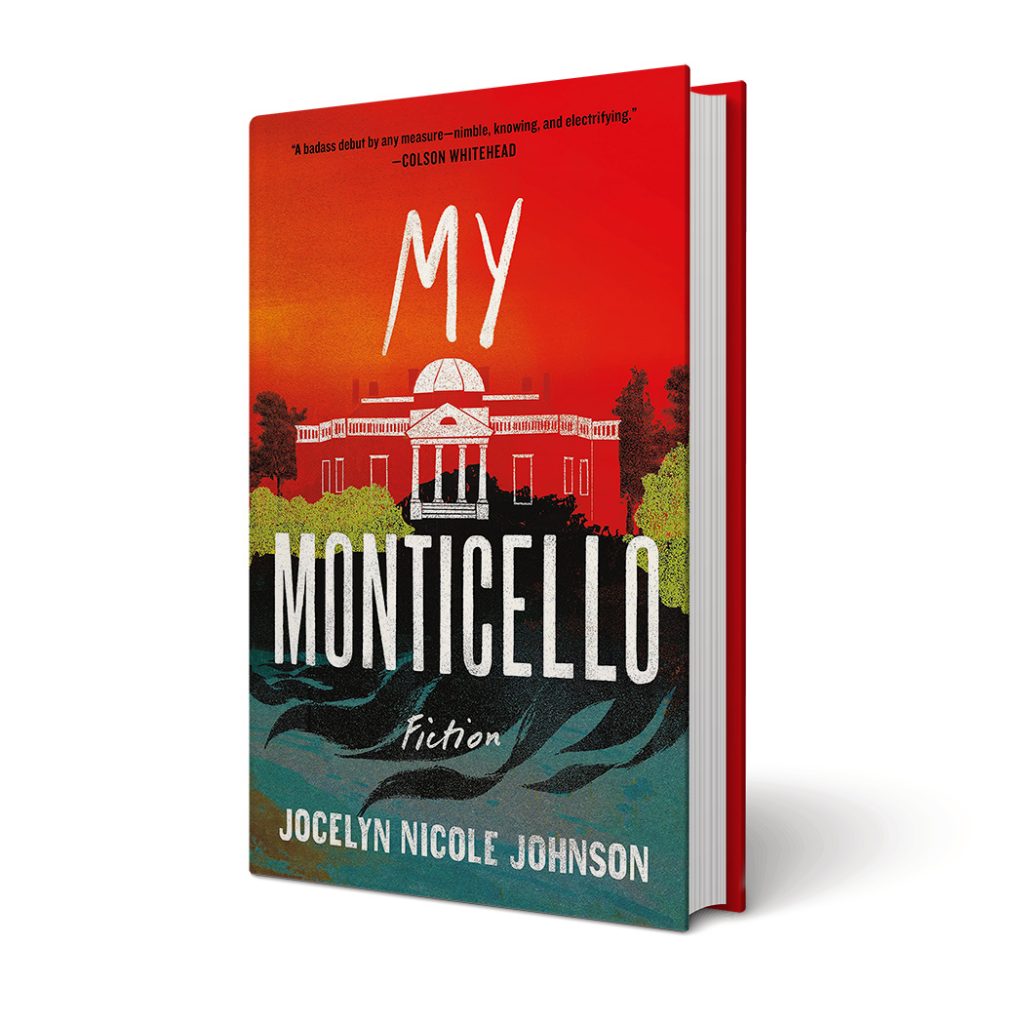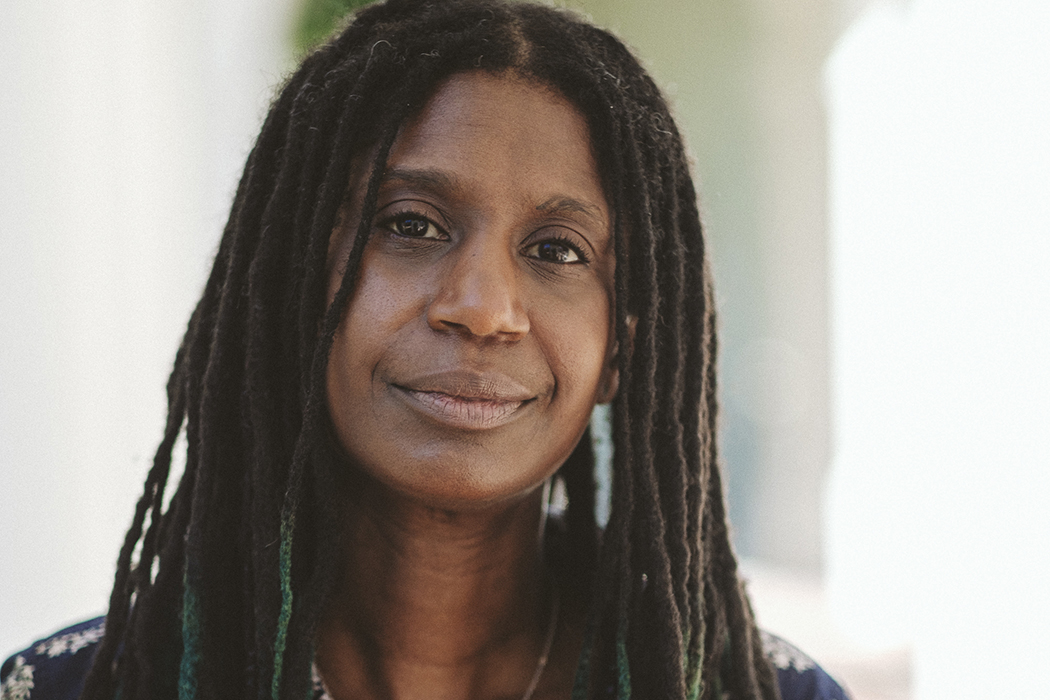Charlottesville writer Jocelyn Nicole Johnson’s first book is getting a lot of buzz. She’s earned accolades from acclaimed authors, like Colson Whitehead, who called My Monticello “a badass debut by any measure—nimble, knowing, and electrifying.” It’s a Kirkus Prize finalist, and a Netflix adaptation is already in the works.
“It’s great and a little crazy,” says Johnson, whose book of five short stories and a novella comes out October 5.
Although Johnson taught art in local schools during the 20 years she’s lived in Charlottesville and says teaching “is a love of mine,” this is not her first time putting pen to paper. “I’ve been writing for a really long time,” she says. “I’ve been down this road before” trying to get a work published.
Locals will recognize many details in her stories. In the title novella, “My Monticello,” residents of First Street, which is around the corner from where Johnson lives, flee violent white supremacists by riding a JAUNT bus to Monticello. “That story absolutely was influenced by August 12,” says Johnson.
The JAUNT bus is driven by Da’Naisha Love, a UVA student who is a descendant of Thomas Jefferson and Sally Hemings.
“It’s a time of unraveling,” says Johnson. “The grid has gone down. There’s unspecified environmental trouble.”
And armed white men cruise through the city in trucks, carrying burning torches and shouting “ours!” The scene recalls the summer of 2017, when the Ku Klux Klan came to Charlottesville and the deadly Unite the Right rally followed. “It was disturbing and really troubling,” says Johnson.

After that summer, the city and the nation began discussing the history of race and racism in Charlottesville. During the 20th century, the city erected statues of Confederate generals, closed schools to avoid integration, and razed Vinegar Hill in the name of urban renewal. The period after the summer of 2017 “was a time of reflection for me,” Johnson says.
The story “Control Negro,” published in The Best American Short Stories of 2018, contains an incident in which a black UVA student is handcuffed and bloodied on the Corner. It was “definitely a reaction” to Martese Johnson’s arrest by ABC officers in 2015, says Johnson. She calls it a “Frankenstein story about who gets to claim America, who gets to be safe here.” Seeing a UVA student “bullied” by ABC agents made her think, “That could be my kid or someone I knew.”
Johnson sees connections between white supremacy and the environment. “I believe the identities we bring and how we treat others is absolutely connected to how we treat the environment,” she says. “I’m worried about all of it, honestly.”
Her stories “think broadly about the idea of home,” she says. “Who gets to claim America economically, who gets to afford to be safe, and what’s going to be left to claim if we don’t take care of the Earth.”
One of those stories, “Buying a House Ahead of the Apocalypse,” is written in the form of a list: “Check your credit score with that app on your phone when you bolt awake in the middle of the night. Scroll to see how swiftly the Amazon burns. Scroll to see how many hundreds of species have been lost or consumed within the last twenty-four hours.”
“I have crazy to-do lists,” chuckles Johnson. “I have to make side lists and then I put post-its on that.” It seemed natural to her to make a list when buying a house. “And your anxieties creep into that list and then your desires creep in.”
UVA English professor Lisa Woolfork is teaching My Monticello in a graduate class on contemporary African American literature this semester. “Jocelyn’s writing is dynamic yet precise, affirming as much as it disrupts,” says Woolfork. “I especially appreciate the local context that she shapes with such a deep imaginative complexity. And even as her work has a strong local connection, there are ways that her stories illustrate meaningful, if difficult, truths that resonate far beyond Charlottesville.”
Esquire named My Monticello to its best books of fall 2021, and calls Johnson “an electric new literary voice” and “an emerging master of the short story form.” (Esquire also adds another Charlottes-villian’s work to that list: Lincoln Michel’s The Body Scout.) My Monticello made Time magazine and Chicago Tribune lists, and it’s still early in the best-books season.
The day before Johnson spoke with C-VILLE, she was nominated for the Kirkus Prize, where she finds herself in competition with Colson Whitehead’s new book, Harlem Shuffle. And LeVar Burton and Aja Naomi King will narrate the audiobook of My Monticello.

“Let’s just say it’s exceeding my expectations,” says Johnson.
Her current agent—her third—”really loves short stories,” which Johnson says is rare in the publishing world, where the novel “is considered the gold standard.” Johnson decided to make her collection of stories about Virginia, and “got a ton of interest.” She ended up with a two-book deal with Henry Holt/Macmillan, which “made me an offer I couldn’t refuse.”
Says Johnson, “It’s been this really long, long journey. I turned 50 this year. I think it’s kind of funny I’m going to be this debutante.”
But she seems to have known all along she’d be a writer. A photo of her as a child on a card is captioned, “This is the author. She was 7 when she made this.”
Laughs Johnson, “I especially like that I wrote it in the third person.”
Her book tour will be mostly virtual, with local events at The Haven and Monticello, the latter of which of course figures prominently in the novella. Perhaps Monticello will carry her book—disruptive, challenging, and unusual as it is—in its gift shop?
Says Johnson, “That’s my goal.”
New Dominion Bookshop and WriterHouse will host an in-person launch of My Monticello October 8 at 7pm at The Haven.


